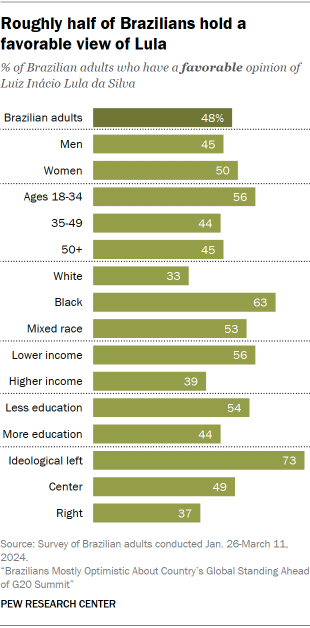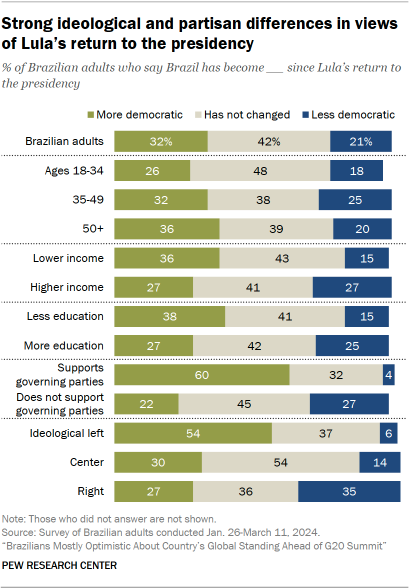Here are key takeaways about how Brazilians see their president and their country’s major opposition leader:

- Brazilian adults see President Luiz Inácio Lula da Silva slightly more favorably than his predecessor, opposition leader Jair Bolsonaro. While 48% hold a favorable view of Lula, 40% hold a favorable view of Bolsonaro.
- About four-in-ten see Lula’s return to the presidency as having no effect on Brazil’s democracy (42%). About a third say Lula’s return has made Brazil more democratic, and around a fifth say it has made Brazil less democratic.
Favorability of Lula
Favorable views of Lula are about as common as unfavorable views (48% vs. 49%). This is largely unchanged from evaluations in early 2023.
Brazilians ages 18 to 34 are more likely than their older counterparts to see Lula in a positive light. Favorable views of Lula are also more common among Black or mixed-race Brazilians than among White Brazilians. And adults with less education and lower incomes report more favorable views of Lula than those with more education and higher incomes.
Stark ideological differences are present in evaluations of Lula. While 73% of Brazilians on the ideological left hold a favorable view of their president, only 49% of those in the center and 37% of those on the right see Lula positively.
Lula’s effect on democracy since returning to office
We asked Brazilian adults to evaluate what kind of change they’ve seen to Brazil’s democracy since Lula’s return to the presidency in January 2023. (He had previously held the office from 2003 to 2011.)

The most common opinion is that democracy has not changed since Lula returned to office; 42% hold this opinion. Another 32% think Brazil has become more democratic, and 21% think it has become less democratic.
Though the prevailing view among both lower- and higher-income Brazilians is that democracy has not changed, those with lower incomes are more likely than those with higher incomes to say the country has become more democratic. For their part, those with higher incomes are more likely to say that the country has become less democratic since Lula’s return.
Across age groups, Brazilians ages 50 and older feel most strongly that Brazil has become more democratic since Lula’s return to the presidency: 36% say this, compared with 26% of adults under 35.
Six-in-ten of those who support Lula’s governing coalition say his return to the presidency has made Brazil more democratic. Only 22% of those who do not support the parties in power agree.
Favorability of Bolsonaro

Bolsonaro, who served as president from 2019 to 2023, is seen somewhat less favorably by the Brazilian public. Only 40% hold a favorable view of Bolsonaro, compared with 58% who have an unfavorable view. (The survey took place before federal police recommended charges against Bolsonaro for allegedly forging his COVID-19 vaccination records and embezzling jewelry he received while president.)
Men see Bolsonaro more favorably than women do, as do those with higher incomes when compared with those with lower incomes. White Brazilians are at least 10 percentage points more likely than Black or mixed-race Brazilians to have a favorable opinion of Bolsonaro.
Ideological differences are also present. A 58% majority of those on the ideological right report a positive view of Bolsonaro. By comparison, only 33% of those in the center and 16% of those on the left see him positively.




